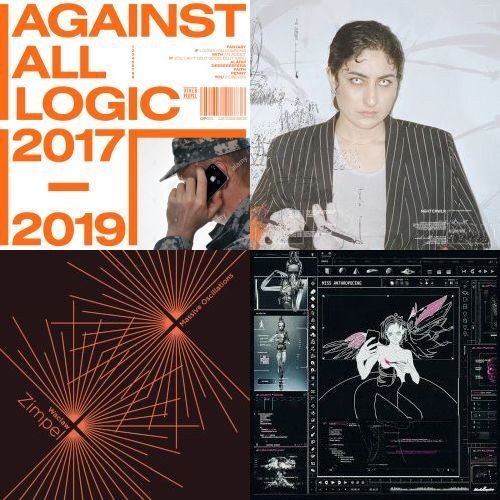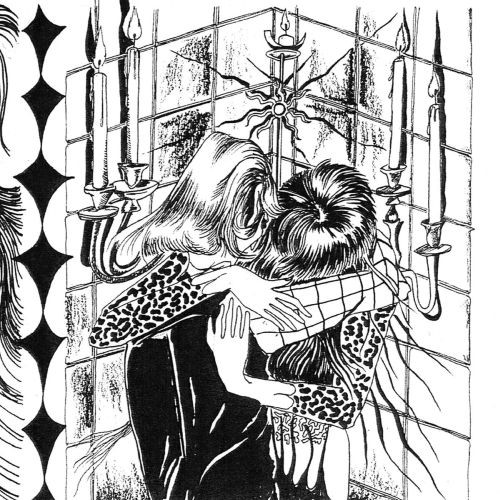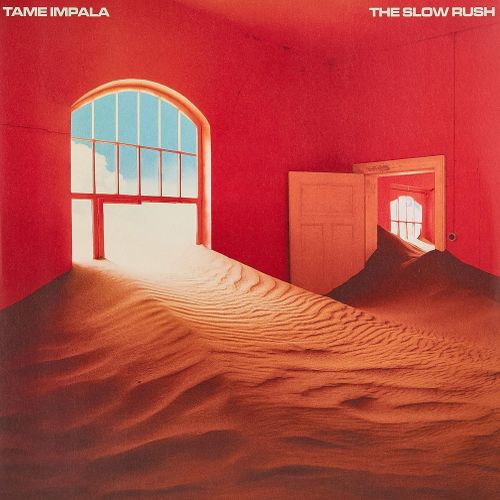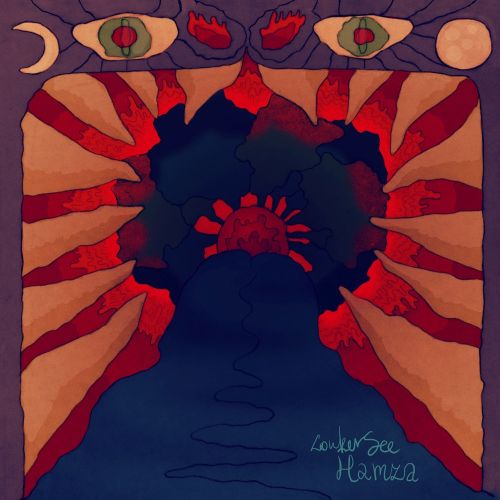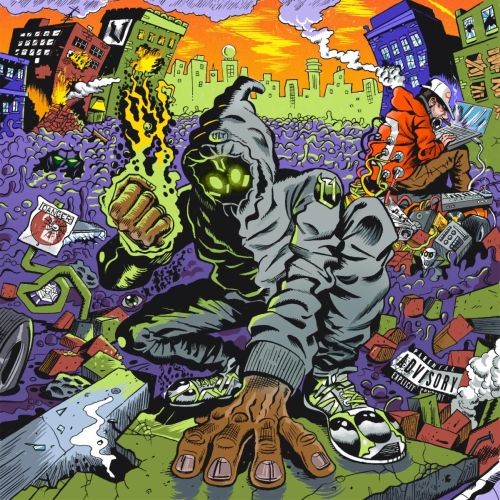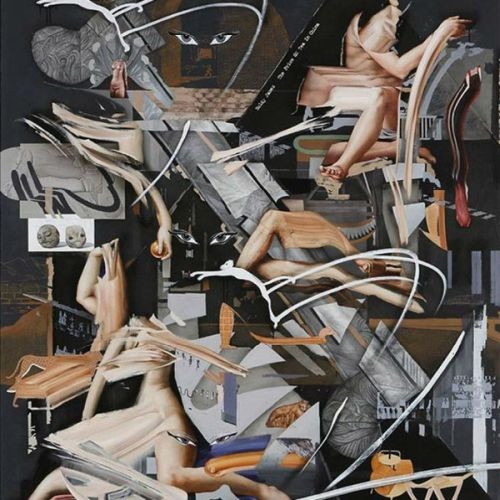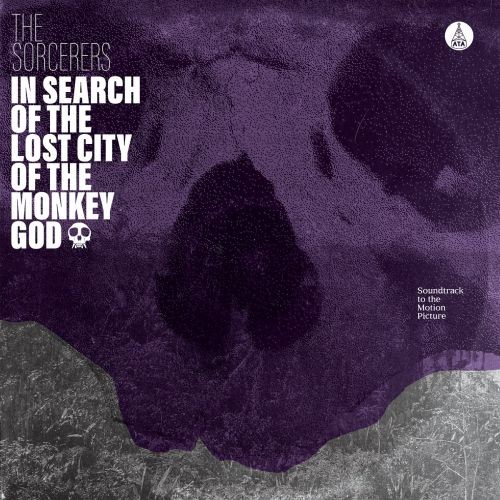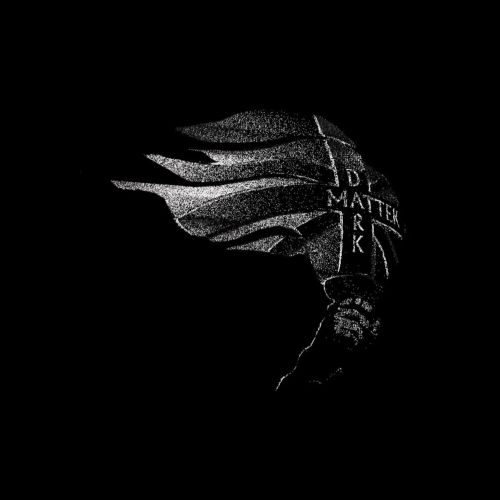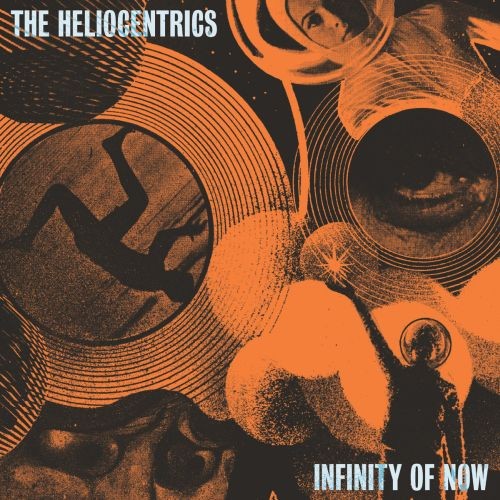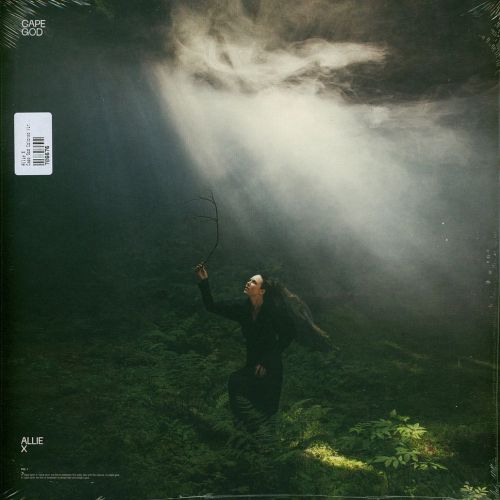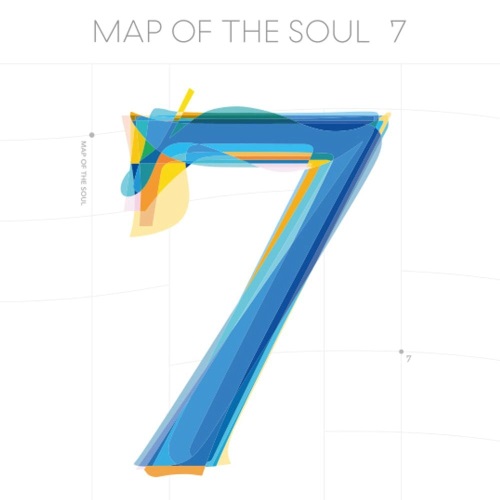Wait A Minute! This Isn't Metal! - February 2020

| Written by: | RaduP, Abattoir, musclassia |
| Published: | March 20, 2020 |
Wait A Minute! This Isn't Metal! - February 2020
Metal Storm's outlet for nonmetal album reviews
Sorry for even bigger delay, we hope we've made it up with how much stuff we've covered here. Stay safe and wash yo hands!
The place where we'll talk about music without growls or blast beats
unless they still have those but still aren't metal
unless they still have those but still aren't metal
We here at Metal Storm pride ourselves on our thousands of metal reviews and interviews and article; metal is our collective soul and passion, which is why we bother with this junk. That being said, we'd be lying if we stuck to our trve-kvlt guns and claimed that metal is the only thing we ever listen to. Whether we want to admit it or not, we do check out some other stuff from time to time; some of us are more poptimistic than others, but there's a whole world out there aside from Satan-worshiping black metal and dragon-slaying power metal. We do already feature some nonmetal artists on our website and have a few reviews to back them up, but we prefer to limit that aspect of the site to those artists who have been a strong influence on the metal scene or who are in some way connected to it. This article series is the place for those artists who don't matter to metal in the slightest but still warrant some conversation - after all, good music, is good music, and we all know metal isn't the only thing on this planet for any of us.
Down below, you might find some obscure Bandcamp bedroom projects or some Billboard-topping superstar; as long as it ain't metal and the album itself isn't a best-of compilation, it fits. Obviously, we're certain that not everything will be for everybody (you guys can be viciously territorial even when metal is the only thing on the menu, and we're all supposed to like the same things), but we do hope you find at least one thing that you can enjoy, instead of just pointing and screaming in horror "Not metal!" as if that would be an insult.
Here are our previous features:
January 2020
December 2019
November 2019
And now to the music...
When Nicholas Jaar first released his batch of material, 2012 - 2017, under the name Against All Logic, I was a bit confused as to why he even decided to release them under a new name, but it's not like it's that unusual for electronic artists to have multiple aliases. 2012 - 2017 had a bit more of a compilation feel considering the timespan that collected the tracks, but all of them had that common dance house thread between them, and the album did turn a lot of heads. Now a continuation for the project with a more concise timespan, 2017 - 2019 cements Against All Logic as a lot more than just a dump of unreleased tracks.
Considering the shorter timespan, 2017-2019 does feel a lot more consistent, and its runtime itself is a tad shorter, making it feel more like an actual album than a compilation. It also does change things up in the sound compared to its predecessor, still having some of the house core, but a lot rougher around the edges and with plenty of industrial and techno infusions. It being rough not only in the more lo-fi production but also in sample integration and overall aggression (for a house record) does not make it any less enjoyable, but gives 2017 - 2019 a different type of charm, one that is still in good terms with how bristling and moody it is.
Bandcamp | Apple Music | Google Play | Spotify
by RaduP
The latest project of Kris Esfandiari (King Woman, Miserable), NGHTCRWLR is an intimidating listen; the ominous, pulsating industrial noise that comprises opening track "Bolt" sets the scene for a half-hour of bleak aggression, only for the title track to throw something of a sonic curveball with its children's choir. Thankfully, this is but a brief detour before more bludgeoning beats. Let The Children Scream is inspired by Esfandiari's upbringing in a cult and rages against abuses of power by those operating within organized religion; it is fitting then that the sound on this record is so oppressive and stifling. The rumbling low end and distorted vocals on "Daymare" bring to mind Pharmakon amongst others.
The vocal approach on several songs is intimidating, comprising monotonic yells shrouded in distortion; however, on more mellowed-out efforts such as "Shine!", with its downtempo beats, a softer, huskier approach is taken, with layers of vocals hinting at harmonizing but more often that not sounding dissonant. The second half of the album in general provides a degree of levity compared to the harshness of the first four tracks, with 808 drum machines increasingly dominating the percussive side of the record. The dark trap style of the closing songs is less abrasive than the likes of "Firestarter" and "Daymare", but similarly sinister, with the slow burn of "Moxofosoleesa" soundly capping off an impressive first outing for this project, one that I'm interested to catch at Roadburn [this statement aged like milk].
Bandcamp
by musclassia
Massive Oscillations does what it says on the tin; Wacław Zimpel, a multi-instrumentalist from Poland, got ample use out of oscillators during the production of this album, as demonstrated on the title track, sustained in large part by the relentless throbbing that lingers beneath the layers of electronic drones that are gradually inserted into the mix. The "massive" part of the equation gradually emerges as the intensity of these drones amplifies, but the underlying oscillating pulses persist with an air of inevitability throughout the opening track, even as frenetic free jazz alto clarinet enters the fray. In contrast, the underlying core rhythm of "Sine Tapes" is more complex and more syncopated, giving this track something of a new age vibe when combined with dreamy, shimmering synths. To be honest, the spastic outbursts of alto clarinet that are half-buried in the mix somewhat detract from the almost spiritual journey this song takes the listener on, through its gradually morphing rhythms and painstakingly judged progression of the ambient electronics; these interjections become increasingly prominent as the song progresses, in my opinion to its detriment, as they take me out of the lush headspace the rest of the song drags me into.
Massive Oscillations is comprised of four lengthy tracks, the first three of which share major similarities whilst remaining their own beast. Unlike the relentless oscillating of the title track and the new age serenity of "Sine Tapes", "Random Odds" crackles in the way the electronics are produced, this grainy sound contrasting with the structureless keyboards that roam throughout the song, finally closing out the track with some high-pitched exclamations. "Release", the only song not to break the 10-minute mark, is a tranquil affair, with most of the texture being provided by wordless, ethereal singing from guest Holly Hock. The freeform nature of much of the instrumentation on this album isn't quite to my liking, but when it works well, Massive Oscillations takes the listener on some quite entrancing adventures.
Bandcamp | Apple Music | Google Play Music | Spotify
by musclassia
I really can't believe we live in a world where Elon Musk is dating Grimes, and it's only more surreal from here. I was expecting that her newfound meme fame would make a lot more people interested in her music as well, but it seems that most people who are now Grimes fans, were fans beforehand. But she uses some of the pop fame that she has to create her own pop image of a sort of sci-fi villainess in an album about making climate change "fun", whatever the hell that means. Of course some of it is still a front to talk about some more personal stuff, so the combination of that with the more campy sci-fi stuff only makes the maximalism even more effective musically, but more obscure conceptually.
Grimes vocals were always processed beyond belief and most of her appeal also came from how creatively it was processed and integrated with the music, and that is indeed continued here as well, but it's for the first time that I was actually more interested in her relaying her experiences since a shitload of stuff happened in the past five years since her last album, so in that regard Miss Anthropocene is just out of reach. Instead, it's still great to appreciate this for just how campy, fun and creative a lot of the soundscapes here are, even though some of those don't work just as well as on her previous album, and a lot of great stuff only comes on the deluxe edition of it, like the guitar-heavy "We Appreciate Power".
Apple Music | Google Play Music | Spotify
by RaduP
Pinking two (sub)genres to define King Krule's sound is really a daunting task, so I went with the ones that will likely attract most eyes, but you'll find blues, jazz, dubstep and soul in it as well. This doesn't make it a mishmash of sounds with no personality, but it is due to how King Krule personality oozes into these sounds to create his own sound that feels jazzy, bluesy, electronic and soulful along with punkish and rockish and artful. He oozes of a drunken London poet with a fatalist view on love and a knack for self-deprecation and the late night. The latter most of all, since this is also like his previous albums recorded at night.
I'm not so sure about the other ones since I didn't pay that close an attention to the lyrics, but it's a tad clear that there's some changes to Archy Marshall the person since the last record. The usual anguishes are there, but now he's a parent and he's no longer living in London, which are things that are obviously going to affect a person's creative process. So strangely feeling both hopeful and fatalistic comes Man Alive!, finding a man both ready and terrified to move forward. And that anguish comes through low key guitar feedback, plenty of psychedelic and electronic effects, some saxophone, and most of all those ragged instantly recognizable vocals.
Apple Music | Google Play Music | Spotify
by RaduP
Holy fucking shit! It's been so long that a band's debut really hit me this hard and had me this excited. Coming off the heels of a few singles and an EP, HMLTD make West Of Eden a slightly-less-than-50-minutes-long piece of music that both pays respect to a lot of their 80s influences while not turning into usual rehashes and re-contextualizing most of the post-punk/glam punk/art rock/new wave sounds of the era. It's been really long that I heard music that clearly takes cues from the era but is thoroughly ambitious and exciting in how it approaches and distorts it. HMLTD do so much more than just a few synths and drum machines and cold guitars, their songs are explosive and maximalistic and they never shy away from unorthodox combinations, like having a song have both spaghetti western guitars and a trap beat (Ok, maybe with "Old Town Road" last year, that's not as bold).
West Of Eden is full of life, youthful energy, ambition, sex drive, death drive, fairly thoughtful approaches to social and political issues, which is punk and all, but also with a lot of pop appeal. It has pulsating beats that could either be some trap or some electro-industrial. Honestly West Of Eden is so many thing that shouldn't work together, but they ooze of so much confidence, they perform them so well, their production so crystal clear, that there's absolutely no way that don't get you moving in some way. It's looking back and looking forward. It's pop and it's punk and it's not pop punk. Really great to see England being on the forefront of great rock music again, and I honestly can't fucking believe how catchy and engaging this one is.
Bandcamp | Apple Music | Google Play Music | Spotify
by RaduP
Someone familiar with Katie Gately's debut album Color might wonder just what happened to result in such a seismic shift in tone by the time her sophomore record, Loom, arrived four years later. In contrast to the glitchy electronics, energetic beats and lively vocals that came previously, Loom opens with swirling ambiance before segueing into "Allay", a more subdued affair characterized by a hurricane of Kate Bush-esque overlapping vocals underpinned by simplistic, almost industrial percussion. Loom was seemingly never intended to be Gately's second full-length, the previous version of which was nearly completed before the devastating diagnosis of her mother with terminal cancer; the experience of watching the disease consume her mother and the resulting grief were the architects of this stylistic transition towards a darker, more textured sound.
The dark, throbbing electronics, layered vocals and churning noise of "Waltz" conjure a real sense of unease, further amplified by the staccato singing approach and distortion applied to Gately's voice. The album's centrepiece, "Bracer", was apparently a favourite of her late mother's, with good reason; this 10-minute odyssey commences with sparse noise and gong hits, and gradually drags the listener into a mechanical nightmare, melancholy vocal arrangements in the midst of clanging industrial sound effects, harpsichord and a cacophony of woodwind instruments. The ability of Gately to compose something as dark, intricately arranged and progressive as "Bracer" so early on in her musical career is pretty staggering, particularly given the departure Loom is sonically from Color. There's no real let up in quality in the second half of the record; Loom, born from such darkness, is an emphatic artistic statement.
Bandcamp | Apple Music | Google Play Music | Spotify
by musclassia
What's Tonight To Eternity is the fifth record released under the Cindy Lee moniker by Patrick Flegel, formerly the guitarist and vocalist of Women. A substantial deviation from the indie rock of that former project, What's Tonight To Eternity is far more unorthodox and abstract. "Plastic Raincoat" is a very stripped-down and freeform beginning to proceedings, but it's on "I Want You To Suffer" where Flegel lays out the identity of the record; starting off with something that, if produced and arranged differently, could make for easy-going late 60s-style rock, with the regular bouncy drum pattern and soft vocals. This is undermined, however, by the increasingly noisy arrangement surrounding it - the high-pitched dissonant keyboards and chaotic squeals of what I can only assume is a guitar distort this happy backdrop, which ultimately falls apart in a wall of feedback and noise.
From then on, the record goes in a range of directions, with the lo-fi trip rock vibe of "The Limit" starkly contrasted by the oscillating electronics of the title track and disorienting noise of "Speaking From Above", the latter of which bleeds organ and pulsing electronics into the sonic maelstrom to further shake things up. Arguably the most notable track on the record, however, is the synthpop of "Lucifer Stand", an unusually clean song that culminates in an extended spoken word segment detailing a woman's relationship with God and Satan. What's Tonight To Eternity is an abrasive, bold and wildly imaginative album, and a marked contrast from the relatively conventional output of Women.
Bandcamp | Apple Music | Google Play Music | Spotify
by musclassia
Time is a pretty dangerous thing, considering how little control over it we actually have. You can ease your life as much as you want, but the passage of time is something irreversible, and that's pretty much what troubles Kevin Parker on the newest Tame Impala record, The Slow Rush. Even the title is pretty suggestive of it, but it's also clearly an album affected by the pressure of following up 2015's Currents, an album that catapulted Tame Impala to huge popularity. The Slow Rush kinda threads the same waters as Currents, but somewhat less interestingly. But even as somewhat underwhelming as it is, a Tame Impala record is always a place for music with some damn good vibes.
And that's what we get on The Slow Rush too, plenty of interesting moments splintered throughout some fairly standard ones. Tame Impala have proven their ability to manipulate sound into some great psychedelic haze and meditative mantras that have some massive pop appeal as well, but maybe they were never really as great if The Slow Rush doesn't suffer as massive a change in sound, but a noticeable dip in quality. Don't let this discourage you from checking it out, there's still plenty of great synths, repetitive vocal lines and grooves to keep it interesting as long as you shake off the slight feeling of underwhelming. Maybe it doesn't need to be the most immersive and trippy and layered thing. Maybe it does just what it needs to be, which is reassure us.
Apple Music | Google Play Music | Spotify
by RaduP
"Infinite Garden", the soft, soothing introductory track of Hamza, is a somewhat misleading beginning to proceedings, featuring a duet between gentle singing and low-key saxophone above quiet acoustic guitar; in contrast, the album closer "Earth Is Flat" is a gradual descent into chaotic noisy free jazz. The journey of the intervening five songs is a more conventional display of moody psychedelic rock with jazzy elements. The ominous brood of the opening moments of "Gdynia80", named after the origin of this Polish group, gives way to swirling space rock sound effects, twisted grooves and somewhat exuberant yet sufficiently restrained saxophone. Bassist/vocalist Joanna Kucharska does make some background vocal contributions towards the end of this track, but despite the expectation set by "Infinite Garden", the remainder of this album is predominantly instrumental.
"3-4-8" is a more uptempo effort than "Gdynia80", and also a bit more of a grating one; the jagged guitar riff is less than ideally accompanied by a ill-fitting and unstructured saxophone performance. Eventually, everything calms down, and the softer saxophone-dominated section that begins around the halfway mark is far more appealing, albeit all too brief. The title track and centrepiece of the record is a far softer song than the two that preceded it, and with the most extended vocal performance outside of the opening track. The subtle brood and restrained percussion of "Hamza" makes for a nice breather before "Put Me Out", a really nicely composed track that is probably my pick out of the bunch on Hamza, featuring a really nice build from a quite spacious and freeform intro to an increasingly energetic rock climax. Although there's moments of irritation on Hamza, most egregiously "3-4-8" and "Earth Is Flat", when Lonker See get it right, they can deliver some really compelling psychedelic rock.
Bandcamp | Apple Music | Google Play Music | Spotify
by musclassia
Officially the 2020's most unfriendly tracklist, so much so that only about half the tracks actually get scrobbled for me, comes Denzel Curry's new collab EP with Kenny Beats, who, as the title implies, does the beats on this thing, while Denzel does the rapping obviously. This is sort of a more multimedia experience, if the comic book aesthetic of the cover art didn't feel multimedia enough, as the album is accompanied by a short film, in which they gotta infiltrate Kenny's computer to get the album's leaked files back, which might explain the track names, and in which each "world" that they have to find the file in is in a different animation style. Seriously, watch it!
As far as the music goes, barely under 20 minutes of Denzel Curry is a bit too little for me, but it seems that he has a knack for releasing shorter projects lately, so as long as each track is of quality, I don't really mind. Kenny is a great match for Denzel, with some boom bap or hardcore hip-hop or even some slightly groovier beats to work over, where the only complaint that one could think of is that it's not gritty enough, but it has Denzel rapping over it, so that should make it gritty. Denzel seems to channel some of his inner DMX on some tracks here, but keeping it short enough of rehashing and more of carrying the torch.
Bandcamp | Apple Music | Google Play Music | Spotify
by RaduP
It's not every day that you see a hip-hop album with a cover that looks like an avant-garde Bosch painting. Generally you'd expect something like that to be especially out there, and while The Price Of Tea In China isn't completely by the books, it's definitely not as abstract as the cover art would suggest. But fairly abstract it still is, with a pretty conscious take on Gangsta rap from a man who had to delay this sophomore album by a few years due to a prison sentence. His debut was also produced by The Alchemist, so the bond between the two goes way back, but it is on the previous EP, Boldface, and here that his name appears in the album artist tag/
It's always great to hear a rapper and a producer who really have some chemistry between them, fitting especially due to the producer's name. The production on The Price Of Tea In China is a very low-key and spacious, something that would be at the risk of lacking any energy in the wrong hands, but here in combination with Boldy's flow and his lyrical takes, it actually makes him seem that much wiser, and the album more immersive. Already in his mid 30s, a great deal of years ahead of most people's sophomore albums, it might explain the fairly 00s feel of this one, but Boldy really shows his experience both in the lyrical field as well in how he can hold his own when put alongside guest spots from Vince Staples, Freddie Gibbs or Evidence.
Apple Music | Google Play Music | Spotify
by RaduP
When I saw the "Ethio-Jazz" tag I thought to myself "How cool! Ethiopia has its own jazz subgenre. I must write about this Ethiopian band." And I listened to In Search Of The Lost City Of The Monkey God and it was indeed funky, groovy and fairly spiritual. And then I visit their Bandcamp to be greeted by the realization, that not only are The Sorcerers not from Ethiopia, they're actually a bunch of white dudes from England. I mean, I'm not that deep into jazz, but kudos for having me fooled. I do feel that there are some very irky lines that might be crossed here, and I don't like to be the one to throw the "cultural appropriation" argument, but I do feel a bit guilty that the only ethio-jazz album I ever wrote about wasn't made by Ethiopians.
So instead, in my proceeding short dive into some actual ethio-jazz, I found some fairly big names on Bandcamp, like Gétatchèw Mèkurya, Hailu Mergia, and Mulatu Astatke, the latter of which actually has a collab record with another band in this article, The Heliocentrics. Coming back to The Sorcerers now, their sound does border on funk quite a bit, but never leaning too much into it, very often just following along the repetitive rhythms, with each of the instruments taking its sweet time in the forefront one at a time, which does create a somewhat ritualistic vibe out of all of it. The flutes and drums most of all sound fantastic on this record. And there's just enough funk to keep it all in good fun.
Bandcamp | Google Play Music | Spotify
by RaduP
Moses Boyd, a jazz drummer with a range of credits, collaborations and awards to his name despite only recently graduating music school, makes his full-length debut as a solo artist and producer on Dark Matter and continues the increasingly popular fusion of jazz with the likes of hip hop, electronica and more. "Stranger Than Fiction", an immediate demonstration of Boyd's percussive abilities, is an engaging opening piece, combining frantic drumming, hip hop beats and soulful brass arrangements to produce something based in jazz whilst sounding thoroughly modern. "B.T.B." is a more uptempo affair, featuring various exchanges between guitar, bass, trumpet, saxophone and more, all carried along by Boyd's frenetic percussion.
Songs such as "B.T.B." and "Y.O.Y.O." feel quite classic in their demonstrations of virtuosity. "Shades Of You", featuring Poppy Ajudha on vocals, is another beast; the underlying beats and electronics draw far more from garage music, whilst Ajudha provides a poppy soul vibe to proceedings. "Dancing In The Dark", on the other hand, draws far more from afrobeat, particularly with Obongjayar's guest vocals. The experiments continue throughout the remainder of this album, with multiple other guest appearances. Perhaps the most notable of these diverse tracks towards the end of Dark Matter is "Only You", a darker affair almost entirely carried by the drums, above with scattered vocals interject. The sheer diversity of Dark Matter demonstrates that Boyd is brimming with ideas of how to fuse his various musical influences, and highlights why he has made such a name for himself so early in his musical career.
Bandcamp | Apple Music | Google Play Music | Spotify
by musclassia
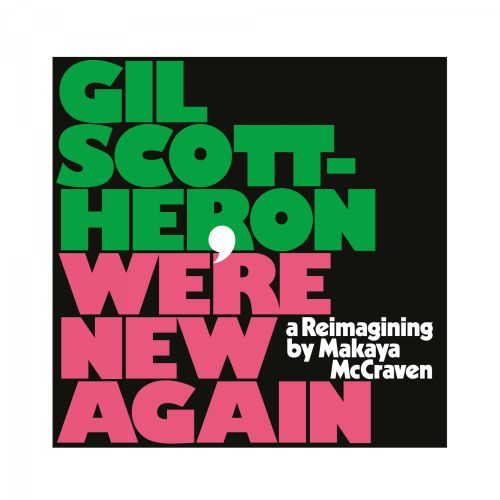
Makaya McCraven / Gil Scott-Heron - We're New Again: A Reimagining by Makaya McCraven
[Nu Jazz | Avant-Garde Jazz]
So this is a record with a lot of legacy, in the sense that it's the hardest to really take out of context. First and foremost, you'd have to know who Gil Scott-Heron is, but in case you don't know, he's one of the greatest soul/spoken word artists of all time, and he had a bit of a falling off after his heyday in the 70s only to come out with a sort of post-industrial trip-hop album in 2010 called I'm New Here. That album was remixed by The xx's Jamie xx under the name We're New Here, this time with a more UK garage / dubstep edge. Scott-Heron died shortly later. Enter Makaya McCraven.
What is amazing here is that if you completely ignore the previous paragraph and go in blind, you wouldn't immediately notice this being re-purposed music, as Gil sounds really in sync and well integrated with the rest of the music, which is obviously harder to achieve with the very sample and remix form of most electronic music, but even for jazz it isn't that easy to make it feel like the band and the singer were in the same room if they weren't. We're New Again is groovy, with some slight hip-hop feel to match Gil's proto-hip-hop spoken word and some avant-garde sounding horns to match his bluesy raspy vocals, on a record that still sounds as fragmented as the original.
Apple Music | Google Play Music | Spotify
by RaduP
The psychedelic krautrock of "99% Revolution" caught my attention pretty instantly when checking out this month's releases; the funky rhythms, smooth vocals, cheeky electronics and bombastic finale gave off all the indications of being the beginning of something pretty great. Mercifully, the remainder of Infinity Of Now did not let me down. The Heliocentrics are an eclectic musical collective from London that draw on influences from jazz, psychedelic rock, funk, krautrock, electronica and more to conjure up a vibrant and varied sound. "Venom" has something of a trip-hop vibe to the vocals and percussion at times; however, the busy basswork and noisy guitars hint at some of the twisted mania that will eventually arrive before the song has concluded.
Some songs focus on certain aspects more than others, moving them closer to or further from my own tastes; the wild, noisy saxophone on "Elephant Walk" is hugely grating, whilst the clean guitar, keyboards and slick rhythms of "Hanging By A Thread" are far more accommodating. However, the kinetic energy that drives all of this can overcome a lot of this hesitation; even "Light In The Dark", the most subdued effort here, has some driving drumming and dramatic keyboard to counteract the sultry trip-hop vibe of Barbora Patkova's vocals. Infinity Of Now is groovy, mysterious and trippy, and synthesizes all the various influences and approaches into a compelling sound.
Bandcamp | Google Play Music | Spotify
by musclassia
Perhaps unsurprisingly, chamber pop isn't my specialist subgenre of music; in fact, if it weren't for Iamthemorning, I probably wouldn't have a single reference point to work with. As it is, I can hear similarities between that group and the work by Dane Agnes Obel on her fourth record, Myopia, particularly on the likes of "Roscian"; however, the music here is oft-times more subdued and gloomy than the work of the Russian band, particularly on opening track "Camera's Rolling". The next couple of songs feature a more vibrant vocal range, and remind me a lot of Kate Bush, who I wasn't shocked to find is both a common reference point for Obel's music and an acknowledged influence. These songs also feature more plucked strings than "Camera's Rolling", on which they offer more dramatic texture to support the piano and vocals.
The title track features some incredibly soothing and enchanting piano work, gently plinking up into the upper registers to counter the staccato strings and muted singing; this song lays its stall out early on, with very little progression across its 5-minute runtime, yet this combination and the compelling vocal performance means that it remains utterly charming throughout. There isn't another song on Myopia that quite pulls off this level of enchantment; nevertheless, the interplay between Obel, the piano, strings and other elements (e.g. the flute on "Drosera") displays enough variety and inspiration throughout to make the full album a soothing and rewarding experience.
Apple Music | Google Play Music | Spotify
by musclassia
What the hell kind of a band name is "Tennis". They don't even sing about tennis. I want my money back. Thank god they at least play some warm indie pop. So Tennis is apparently a duo made up of two spouses, with the wife at the helm of the vocals. Their whole aesthetic seems very very kitsch, akin to a posh upper class couple from the 70s, which should make them somewhat loathe-able. Their music though, while taking a lot from soft rock and R&B from the 60s and 70s, is drenched in plenty of indie and dream pop to make them sound closer to the latter than the former. And honestly it works fairly well with their kitschy image. It's like being on a yacht with your lover thinking about how you're gonna play golf once you'll be ashore.
It's not really a gimmick that sticks too much, but has less of an importance with each release. Sure a lot of Swimmer still deals with marital love, but it doesn't feel as privileged and posh. Now it deals more with getting older and everything that comes along with that. The sun drenched atmosphere actually works really well with the vocals most of all, but this being a self-produced album after a long streak of producer-assisted offerings does bring it a bit more of an authentic bite than previous albums. It's still not anything mindblowing or too original or anything, but Swimmer is pretty much the definition of "nice". It's "nice" music.
Apple Music | Google Play Music | Spotify
by RaduP
The muted pulses that open "Fresh Laundry" set a perhaps misleadingly subdued scene for the listener; the fragile vocals of Allie X and stripped-down arrangement suggest that Cape God may be a somewhat muted affair. This thought is put into question almost as soon as "Devil I Know" begins, a more straightforward pop song with plucked strings and grandstand chorus, and completely forgotten by the time "Regulars" brings its high-pitched vocal interjections in the chorus, contrasted with the otherwise smooth, sultry tone Allie X approaches the rest of this song with. Cape God is an eclectic affair; however, whilst something like Dark Matter by Moses Boyd, also featured in this month's article, is a varied demonstration of a range of influences interpreted by someone with the musical background and intuition to convincingly pull off each stylistic fusion, this album could've probably benefited from greater focus in specific areas rather than the kitchen sink approach.
The whimsy of "Sarah Come Home", stripped-down seductive subtlety of "Ring A Bell" and 80s-inspired "Susie Save Your Love" all have their merits, but feel slightly scattered when put together with all the other different approaches incorporated into Cape God. Less appealing to me were two songs in the middle of the album, the bland duet "Love Me Wrong", and grating rap and robo-vocals of "Super Duper Party People". The closing track "Learning In Public" is a convincing closer, with its mellow chorus and effective vocal layering, and was the most satisfying track for me outside of "Fresh Laundry". Aside from the two songs mentioned earlier in this paragraph, most tracks here generally work quite nicely, but as a collective package, Cape God makes for quite an inconsistent listening experience.
Apple Music | Google Play Music | Spotify
by musclassia
South Korean K-pop seven-piece are one of the most popular music artists of the whole wide world. Not just currently, but for a couple of years now. It would be in vain to discuss about them as a phenomenon (which from many aspects they are), that reaches incomprehensible level of popularity. This year, they are back with Map Of The Soul: 7 record, presenting seven years as the group of seven, and many more of course. Despite their continuous creation of the new music (they have composed around 70 songs up to now), they did take some more time to put together this one, which actually relates to their predecessor Map Of The Soul: Persona EP, released back in April 2019.
BTS' new output is comprised of 19 songs and offers a wide range of diversity within the running time close to 80 minutes. It contains not only "classic" K-pop songs, featuring all seven guys (as it has been more or less usual till now), but also solo performances from every member of the group and collaborations between two or three of them on some of the others. On this piece you'll get a couple of intense, impulsive rap songs, and more usual, sensual pop-moving tunes. It seems that they are improving themselves not only from the aforementioned aspect of variety of the songs and its structures, but also in regards of the quality of the sound and each members performance/execution. The connection and inseparability inside the BTS formation have always been essential, which also tends to help them being more successful than most of other acts. Map Of The Soul: 7 can be rightfully defined as their most mature and complete release.
Apple Music | Google Play Music | Spotify
by Abattoir
And that was it. You've made it through still alive. Congrats. See ya next month.
Comments
Comments: 2
Visited by: 72 users
| musclassia Staff |
| JoHn Doe |
Hits total: 3548 | This month: 37



